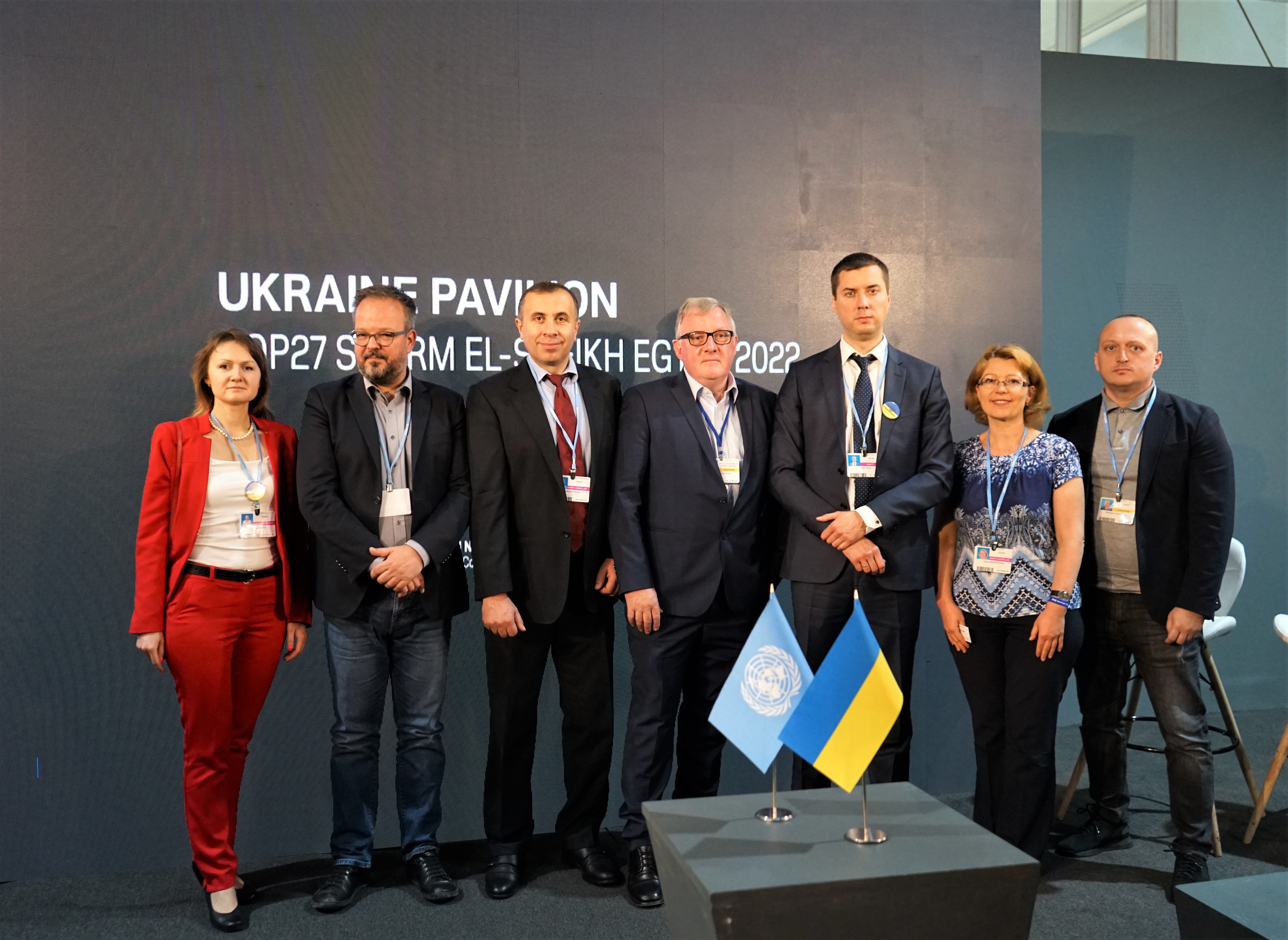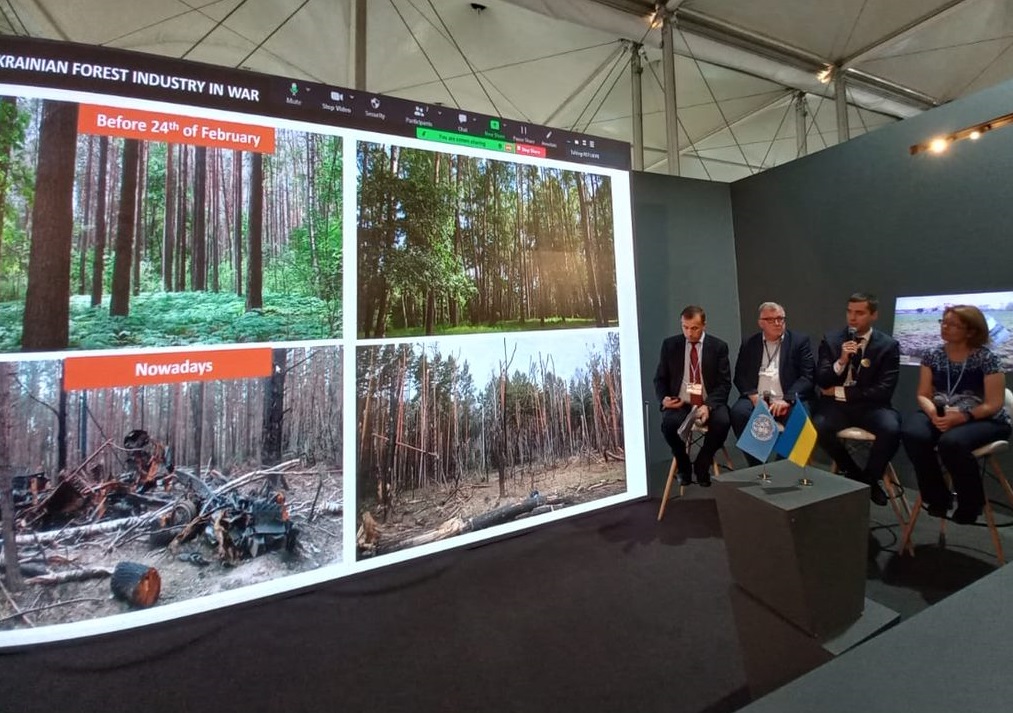A UNDP-sponsored COP27 discussion panel at Ukraine’s national pavilion this week focused forward to green financing, resilience building and sustainable development.
UNDP advocates for and supports a green, inclusive and resilient recovery for Ukraine
November 17, 2022

Ukrainian Delegation at COP 27.
Despite the ongoing atrocities of war and the continuous attacks on civilian populations and infrastructure, the Government of Ukraine is working tirelessly and tenaciously to protect and serve its people. UNDP is there as a partner, walking step in step, expanding emergency support in every area requested. At the same time, through our partnerships and projects, we are working to ensure the development gains of the last decades are maintained and used as a solid basis for further recovery.
This week, the Governments of the world, joined by more than 30,000 participants, have gathered in Sharm El-Sheikh, Egypt for the 27th session of the Conference of the Parties (COP 27) to the UNFCCC. Ukraine has set up a dedicated pavilion at the conference, in which UNDP recently organized a panel discussion on the topic of a “green and resilient recovery for further development.” The panel focused on the prerequisites and possibilities enabling green private financing for Ukraine’s post-war development.
Together with international experts, representatives of the Government of Ukraine and the private sector the panel provided a deep dive into the topics of current trends of the green and resilient recovery in Europe and its implications for Ukraine’s development in different sectors. Issues covered included potential projects in forest management, green financing opportunities available via the application of Article 6 of the Paris Agreement within the framework of the climate agreement between Switzerland and Ukraine, as well as the opportunities for the agriculture sector with the implementation of the proper ESG practices and reporting implementation.
With regards to decarbonization, UNDP is working closely with the State Agency on Energy Efficiency and Energy Saving of Ukraine (SAEE) to develop the roadmap and respective legislation for the implementation of the Guarantees of Origin (GOs) of renewable energy. According to Olena Lenska of SAEE, who spoke on the panel, the ongoing collaboration will also uncover the substantial biomethane production potential of Ukraine, which can generate as much as 9,7 billion cubic meters of gas. Implementation of GOs in Ukraine will have multiple effects for the country including decarbonization of the economy, reduction of the financial burden under the “feed-in” tariff, fulfilment of the country’s international obligations, present a market tool to stimulate investment in renewable energy, reduce the effects of the upcoming CBAM introduction, contribute to reducing environmental taxes and so on.
The practical application of Article 6 was presented by Olga Yukhymchuk of Ministry of Environment Protection and Natural Resources of Ukraine noting the specific steps that yet need to be taken to enable full-scale implementation of the financial opportunities represented by the bilateral climate agreement between Switzerland and Ukraine, which are now being studied together with UNDP in the framework of the needs assessment.
The ongoing war is having a particularly destructive impact on forests, causing mass forest fires across the country. Preliminary estimates of damages to forest ecosystems are $400 million. Panelists noted that more than 450 000 hectares of forest areas remain under Russian control. The presentation noted the ongoing partnership with UNDP to develop the digitized forest management system as a single GIS solution that will enable enhancements in planting and growing, including e-history of forest areas, LIDAR scanning, multi-layer data storage, better protection with state IP-cameras network, terrestrial digital network and harvesting and control, including chain of custody, e-woodcutting permits and certificate of origin together with the system of declaration. The digital solution developed in collaboration with UNDP will take the forest management to the next level enabling access to green financing through carbon credits, which will help further develop the forest sector of the country.

The prospects for medium and small enterprises were discussed in great detail marking the initiative of UNDP together with the Entrepreneurship and Export Promotion Office to develop the ESG tool that will be incorporated in the national DIIA.Business platform. A tool that will help any business in Ukraine start its ESG journey and ultimately obtain access to green and resilient development, as well as help on the way to obtaining green financing.
A representative of Astarta Holding, a Ukrainian agricultural and industrial holding company, emphasized the importance of sustainable development and ESG values for a resilient recovery. During the war, Astarta is following its strategy of green development and inclusiveness to support rural communities. Astarta co-founded a large-scale humanitarian project Common Help UA, which also partners with other businesses, international organizations, local communities and temporarily displaced civilians joining the initiative to provide assistance to those in need, nurture local entrepreneurship, create jobs for displaced people, support domestic producers and the economy as a whole.
The vast number of instruments discussed and presented during the panel discussion are unique in nature as Ukraine in many cases is the first country to start their development and implementation, enabling gained experience to be further expanded in other parts of the world bringing adaptation to climate change, decarbonization, energy efficiency and disaster risk reduction to a higher level of efficiency, and UNDP is proud to be among the main drivers of this process here in Ukraine and worldwide.
For full video of the panel discussion please follow the link

 Locations
Locations